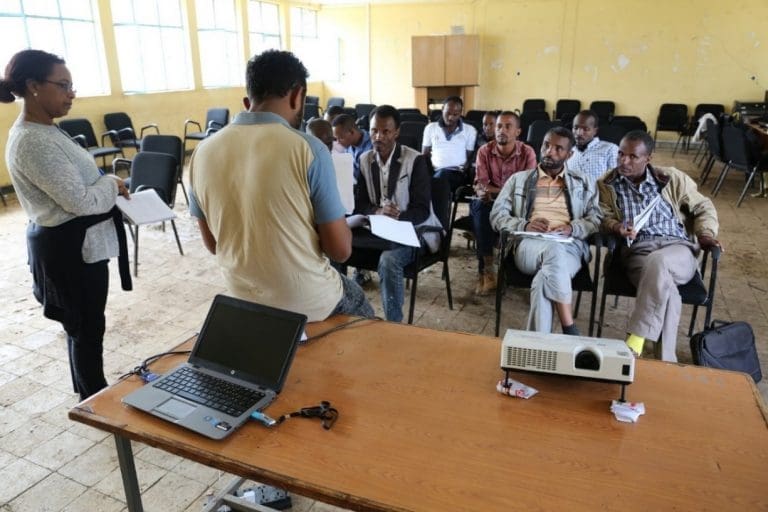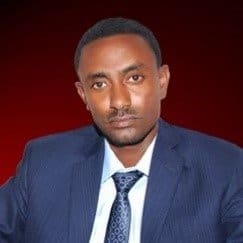
WaterAid staff, Zinash Kefale and Abubeker Kedir, train local government staff to strengthen WASH service level monitoring in Gololcha woreda, Oromia, Ethiopia (November 2017). Government staff pictured: Abu Dinku, Aster Gudeta, Mohammed Hadi, and Habtamu Enda (Water & Energy Resource Development Office); Mohammed Hassen, Tekele Yifru, and Mohammed Abudulahi (Health Office); Bulcha Jimma, Fantu Germew, and Mitiku Kebede (Education Office) (Credit: WaterAid/Behailu Shiferaw)
Alec Shannon (AS), Content Strategist, Agenda for Change: Tell me about the history of WASH services in Ethiopia. How is your work different now than 5 years ago?
Gashaw Kebede (GK), Director of Technical Services, WaterAid Ethiopia: In the last 5 years we have been working in the Oromia and Amhara Regional States across 6 woredas[1]. We started our Sustainable WASH (SusWASH) project in Gololcha Woreda in April 2017. When we started, water, sanitation and hygiene coverage was very limited. There was no government water and sanitation committee in the woreda. There were no accountability mechanisms for the water utility. Since 2017, we have rehabilitated and extended the water supply network, by working with private contractors, local government, and the water utility in the capital of the woreda, Jara town. We are working with the woreda water office and utility to strengthen processes for asset management, budgeting, and planning. We are also working in two remote, rural communities to demonstrate inclusive and sustainable water supply service delivery models, community sanitation, and hygiene behavior change. We have made some notable improvements in sanitation coverage and hygiene practices while working with government employed Health Extension Workers and local artists/actors. There have been major changes in terms of service delivery, integration, accountability, and financing across the woreda, resulting in improved water service delivery.
AS: How are you working with the government (national and/or local)?
GK: At the national level, we are working with the Ministry of Water, Irrigation, and Energy, the Ministry of Health, and the Ministry of Education on creating an enabling environment for WASH systems strengthening. We work with the Ministry of Water, Irrigation, and Energy on how to embed issues of gender and social inclusion[2] into their documents, especially as they revise the national water sector policy. Our work with the Ministry of Education is focused on inclusive WASH in schools and on policy development. We have also supported the Ministry of Water, Irrigation, and Energy technically and financially on developing a climate resilient WASH framework.
We have a memorandum of understanding with the Regional Bureau of Oromia Water and Energy Resource Development – we receive a 25% contribution from the Oromia regional government for every 100% of a project budget that brings water supply to the region, this 25% is mainly allocated towards the costs of infrastructure. We are working across many of the WASH system building blocks, but the regional government is most interested in the finance building block, with a focus on community water supply systems.
AS: Are you working with other civil society or private sector actors to strengthen systems?
GK: We work with many of the civil society organizations and development actors working on WASH in Ethiopia: IRC, CARE, Catholic Relief Services[3], World Vision, Millennium Water Alliance, UNICEF, among others. We have a national forum for WASH systems strengthening. We meet regularly – sometimes monthly, sometimes on a quarterly basis – depending on the need of the various actors.
AS: What are some of the challenges when working in remote, rural locations?
GK: We have faced several challenges working in the remote, rural woreda of Gololcha. One significant challenge has been the complex hydrogeology and the high levels of fluoride in the groundwater[4]. The lack of road access to the woreda also meant that drillers were unwilling to travel to the area (they did not want to participate in the bidding process). This delayed progress considerably.
AS: What are your next steps?
GK: We have already supported the government with the development of a costed woreda WASH plan and established a management information system, but we want to revisit this so that the plan aligns with the National Growth and Transformation Plan and new developments in the sector. We worked with the woreda on asset mapping and Life Cycle Cost Analysis for water supply system components, and conducted a service level baseline to support the woreda in developing a costed WASH plan. Our next step is to attract financing for the plan’s implementation.
AS: What would help you the most to strengthen the WASH system?
GK: The institutional arrangements are one of the major challenges at the national level, because currently Ethiopia does not have an institution or commission that focuses solely on water and sanitation. For instance, the Ministry of Water is responsible for community water supply systems; the Ministry of Health is responsible for sanitation and hygiene; and the Ministry of Education is responsible for WASH in schools. There are mandate overlaps, and unclear roles and responsibilities within the ministries, especially on sanitation.
Ethiopia has a WASH implementation framework that clearly outlines the coordination and integration mechanisms, including the alignment across ministries, but in practice it is entirely different. As an example, the Ministry of Water, Irrigation and Energy has mandates across water resources, sanitation, and energy; instead of focusing on urban sanitation, they may focus investment on transboundary water issues, or they may focus their investment on power and irrigation instead of water supply. That means the investment for water supply could only come from donors instead of allocated budget from taxes and tariffs that the government would allocate. That is why I say that a focus on strengthening institutional arrangements would help strengthen the overall WASH system in Ethiopia.
[1] A woreda is an area – similar in size to a county or district – managed by local government.
[2] [Inclusion] doesn’t just mean having everyone present, but that people are supported to engage in processes that ensure their needs and rights are recognized. Inclusion is making sure that everyone gets the chance to participate fully. Read more here.
[3] IRC, CARE, and Catholic Relief Services are also Agenda for Change members.
[4] Ingestion of excess fluoride in drinking-water can cause fluorosis which damages the teeth and bones (adapted from WHO).

Gashaw Kebede is an experienced WASH leader with over 15 years’ working in the sector. He is Director of Technical Services for WaterAid Ethiopia, where he provides overall technical and managerial leadership and oversight on all aspects of strategy and programming in water, sanitation, and hygiene programmes and projects. He has MSc in Hydraulic Engineering from Arba Minch University and BSc in Water Resources & Irrigation Engineering from Arba Minch Water Technology Institute.
